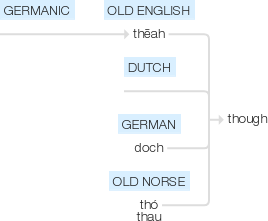Though
Old English thēah, of Germanic origin; related to Dutch and German doch ; superseded in Middle English by forms from Old Norse thó, thau .
wiktionary
From Middle English thaugh, thagh, from Old English þēah(“though, although, even if, that, however, nevertheless, yet, still; whether”), later superseded in many dialects by Middle English though, thogh, from Old Norse *þóh (later þó); both from Proto-Germanic *þauh(“though”), from Proto-Indo-European *to-, suffixed with Proto-Germanic *-hw < Proto-Indo-European *-kʷe(“and”).
Akin to Scots thoch(“though”), Saterland Frisian dach(“though”), West Frisian dôch, dochs(“though”), Dutch doch(“though”), German doch(“though”), Swedish dock(“however, still”), Icelandic þó(“though”). More at that.
etymonline
though (adv., conj.)
c. 1200, from Old English þeah "though, although, even if, however, nevertheless, still, yet;" and in part from Old Norse þo "though," both from Proto-Germanic *thaukh (source also of Gothic þauh, Old Frisian thach, Middle Dutch, Dutch doch, Old High German doh, German doch), from PIE demonstrative pronoun *to- (see that). The evolution of the terminal sound did not follow laugh, tough, etc., though a tendency to end the word in "f" existed c. 1300-1750 and persists in dialects.
